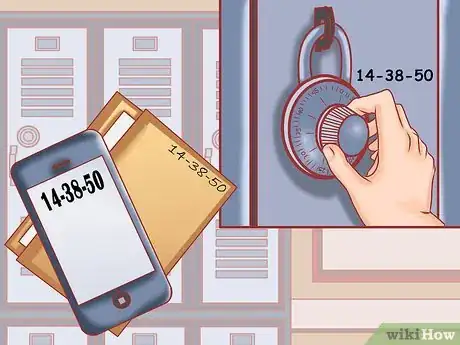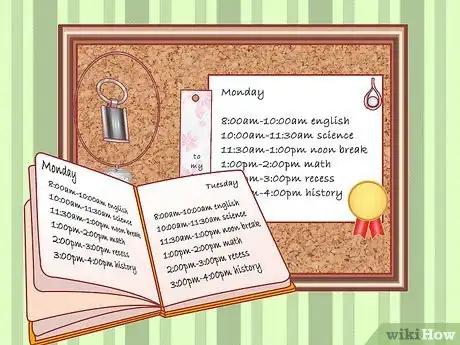This article was co-authored by Daron Cam. Daron Cam is an Academic Tutor and the Founder of Bay Area Tutors, Inc., a San Francisco Bay Area-based tutoring service that provides tutoring in mathematics, science, and overall academic confidence building. Daron has over eight years of teaching math in classrooms and over nine years of one-on-one tutoring experience. He teaches all levels of math including calculus, pre-algebra, algebra I, geometry, and SAT/ACT math prep. Daron holds a BA from the University of California, Berkeley and a math teaching credential from St. Mary's College.
There are 14 references cited in this article, which can be found at the bottom of the page.
This article has been viewed 35,526 times.
Your middle school years are a time in which changes in your life are sure to occur. These include changes in your schooling and changes in yourself as you transition from your pre-teen to your teenage years. It is natural to feel anxiety and pressure about these changes, but it is also a time of great new opportunities for you. If you want to be successful in middle school, read on to prepare for the challenges and opportunities ahead.
Steps
Preparing to Start Middle School
-
1Expect it to be different. Your first day of middle school will be, in some respects, like your first day of kindergarten: new places, new faces, new things to do and new ways to do them. Even if your buddies from elementary school are still around, things will still feel different. Chances are, you will make new friends and they will too. Go into it with an open mind. Embrace the chance to try things in a new way. You adapted well to school once (if you can remember that) so you can certainly do it again.
- People you’ve known for years may start to seem different to you. You may start to seem different to them as well. This is a natural part of growing up.
-
2Define success for yourself. Is it academic achievement, or is success for you based on being a good person? Perhaps, ideally, it should be a combination of both of these. The best judge of whether or not you are a success in middle school is you. But you have to know and establish your own criteria. A good thing to do is to get advice from an older sibling or friend who has already experienced the challenges of being a middle schooler.
- Your parents will have their own ideas of what success means for you. This, of course, is important as well. Talk with your parents about your goals for middle school and how you can work together to achieve them. Remember: you may disagree with your parents' priorities, but if you remain calm and not throw a big temper tantrum if you don't happen to get your way, you'll leave the door of communication open, giving you and your parents a chance to come to some type of mutual agreement. Working together often leads to a reasonable compromise in which both sides are still happy and talking to one another! After all, communication is the key!
Advertisement -
3Prepare for awkward situations. The middle school years are always a time of awkwardness. You are growing, your body is changing, and your interests are evolving. Yes, you’ll get pimples, trip over your own feet, feel embarrassed to get changed in the locker room, get rejected by that boy or girl you like, and so on. Don't worry: it happens or has happened to all of us. A good thing to do is to imagine yourself in other people's shoes and try to imagine how you would feel in their situation. It's also helpful to realize that no one is analyzing everything you do. So chances are, if you have one of those days where everything goes horribly and terribly wrong, it's probably not going to be the talking point of the whole school for 5 years after. So just take a deep breath...and relax.
-
4Be true to yourself. The pressure to conform (or to be like everyone else) grows as you become a teenager. Don’t let peer pressure dictate who you are or what you want to achieve. Although, if it does, don't freak out. It's ok to fit in a little bit despite what all the books say. Do what is right for you and what you’re interested in.
- Stick up for what you believe in and what you know is right. For instance, turn in someone who is bullying you or other kids. If this costs you a childhood friend, don’t worry. You’ll have plenty of opportunities to make new, better friends in middle school.
We're all good at different things. "When I started middle school I was really struggling in math class. I felt like I was the only one who didn't understand the homework and kept comparing myself to my friends. My mom told me that I don't need to be great at everything, and rather than just focusing on what is challenging I should celebrate the things I am great at! I am a really good dancer and learned to celebrate that skill and spend less time comparing myself to other people. Everyone has something they're good at and something they need to work on, and once I learned that I was more successful in school." - Danielle, 8th grader on the dance team
Getting Organized
-
1Learn your locker combination. Having a locker can be a big change. You need to learn your locker combination and remember it. You don't want to end up being late to class all the time because you struggle to get your locker open. Write down your locker combination in a folder or on your phone if you are allowed to keep it with you. This way you will always have the combination, even if your forget it. [1]
-
2Use a student planner. A student planner is a calendar you can use to write down when assignments are due, when you have soccer or choir practice, or when you have sleepovers with friends, for example. Teenagers may not have the reputation for being the neatest, most organized bunch, but you can work to keep yourself and your school materials in order. Doing so will increase your ability to be successful in school.
- Keep track of your schedule and look at your planner every day. Writing in it after every class can be a good way to start the habit.
- Make sure you know when your tests are coming up and when big assignments are going to be due. It is your responsibility to make sure you have your work done on time and are prepared for any exams. Your middle school teachers will expect you to.
-
3Use a separate binder or notebook for each subject. Have one notebook for each of your classes. You may even want to color-code them so you know that the blue notebook is for History and the red notebook is for Algebra.
- Keep these binders organized. Use dividers to separate notes from assignments. The less time it takes you to find your notes, homework, and study guides, the more time you have to actually get things done.
-
4Organize your locker. Go ahead and decorate your locker to show off your personality. Make sure that the things you put in your locker are practical. The biggest mistake is to make your locker an extension of the locker decorations store. Definitely make sure to organize it so you can be in and out of it quickly. You don’t want to have things spilling out of it every time you open it. You should be able to find any assignments or materials that you need for class quickly so you can make it to class on time. Regularly clear out old papers so that you don't have more in your locker than what you actually need.
-
5Have a dedicated homework space at home. Carve out a place for yourself at home to do your homework. This will ideally be a desk with a chair and computer or laptop.This will give you a study environment and helps you to set the mood for studying. Keep the desk clear so that you can easily sit down and do your homework every day after school.
- Store all your school supplies in one place so that you’re not hunting all over the house for the pencil sharpener.
-
6If you want to, have a family meeting every week. Talk to your parents on Sunday afternoon to see what the week looks like. Use this time to remind your parents about your upcoming game or concert. You might also use this time to find out which nights you might have to help out with dinner, etc.
-
7Keep a copy of your schedule on you all the time. You will eventually learn your way around your middle school, but it's important to keep a copy of your schedule on you until you master your daily routine. Middle schools are often larger that elementary school and following your schedule can be confusing at first.
Achieving Academic Success
-
1Attend school. It sounds obvious, but it’s a key part of being successful in middle school. Studies show that good grades and consistent attendance in middle school are indicators of future academic success in high school and college.[2] Get to school on time and don’t skip classes.
- If you need to be out of school, make sure you talk with your teacher about the material you missed. While you're gone, email him or her and check their website if they have one for assignments. Catch up on your homework as soon as possible.
-
2Learn how to take good notes.[3] Whether you had to do it in elementary school or not, the amount of note-taking you will need to do in middle school will be a new experience. Good note-taking doesn’t mean furiously writing down everything the teacher says. Instead, try these strategies to take good notes:[4]
- Keep your notes organized by starting a new sheet every day. Put the date and the title of what you're learning at the top of the page.
- Listen for audio cues from your teacher. He/she will tend to vocally emphasize what is most important.
- Don’t worry about writing whole sentences. Instead, develop your own shorthand and shortcuts. Remember, no one has to be able to read it but you, so go ahead a write a squiggle every time your teacher says "Mitosis". It's okay as long as you understand it.
- Review your notes each day when you’re doing your homework. Rewrite your notes more neatly and fully. This will also help the information stick in your brain better.
-
3Learn how to study. Like note-taking, the amount of studying required in middle school will likely be a surprise. Good study skills do not mean simply memorizing the textbook chapter. Here are some ideas for studying successfully:[5]
- Learn to identify the most important concepts. Highlight key names, themes, etc., in your notes and put sticky notes in your textbook to mark key passages.
- Rewrite your notes so that you can organize the information and make your writing neat and easy to follow.
- Create study aids such as flash cards, diagrams, and so on.
- Find a study buddy. This is ideally someone who has a good grasp on the material.[6] Working together may help you see things from a different angle. Work hard to stay focused on studying. Talk about music or football another time.
-
4Develop good test-taking skills. Tests may be more complicated and you’ll be responsible for knowing more material. To take tests successfully, follow some of these strategies:
- Listen to instructions that your teacher gives you. Read all the directions on the test.
- Pace yourself. Be sure to leave yourself enough time to finish the entire test. Don’t keep looking at the clock, since that might stress you out more. But gauge how long it might take you to answer questions in each section of the test. If a question stumps you, come back to it later.[7]
- Double-check all of your answers.
- Reduce anxiety you might feel about taking tests. When you are more prepared and understand the material, your anxiety will lessen. Take deep breaths before the exam and repeat to yourself, “I will do well on this test.”
-
5Do your homework right away. There are more demands on your time in middle school. You’ll have more classes, more homework, more tests, and more extracurricular activities. Improving your time management skills is key. Make your schoolwork a top priority, so that you get it done on time.
- Try to complete all your homework as soon as you arrive home from school. Do this before distractions and responsibilities take over. If you have to attend to other things as soon as school is over, block out a specific time each evening for homework completion.
- Keep limits on your “screen time.” This includes your phone, TV, computer, etc.[8] Don’t play computer games or text with your friends until your homework is done, for example.
- Take responsibility for your own learning and homework. Don’t copy your friend’s homework.
- If you’re having trouble keeping up in a class, talk to your teacher sooner rather than later. Don’t wait until you’ve fallen hopelessly behind.
-
6Ask for help when you need it. As you get older, more of the responsibility for your academic success rests on your own shoulders. But this doesn’t mean you have to do it alone. There are many different people who want to help you, so let them.
- If you’re having trouble with pre-algebra or early American history, for instance, talk to your teachers about additional resources that might help. Your teachers may even be able to suggest tutoring options.
-
7Admit when you’ve made a mistake. If you haven’t done your homework, don’t lie to your teacher. Instead, tell your teacher that you will work on it tonight and hand it in tomorrow. Your teacher will appreciate that you’re taking responsibility.
- Don’t cheat on tests or copy other people’s homework. If you do and you get caught, don’t try to lie your way out of it. Tell the truth.
-
8Do your homework. You will typically get 1-2 hours of homework each day in middle school. Do your homework first while the instructions or lessons are fresh in your mind. Always do your assignments before going out to play or watching television.
-
9Go to every class. Be on time. Teachers will keep track of your attendance and whether or not you were at the class on time, or not. If you are late or absent without being excused, it can negatively affect your grades.
-
10Take good notes. Learn and use a good note taking strategy.[9] Write down key points from your class lectures and discussions. Listen for indications from your teacher when information is likely to appear on your future quizzes or exams. You can review your notes at home to quickly go over the topics and lessons you covered. Even if you feel like you know all the material, learning to take good notes now will be a major asset when you go on to high school and college.
-
11Be healthy. If your body feels good then so do you. Take up sports and physical activities, but don't overdo it or starve yourself, do what feels right to you. The goal isn't to have a 'perfect body' but rather to be on top of your health and take care of yourself. Also, the junk food that kids eat isn't good and should be replaced by healthy substitutes whenever possible.
-
12Get enough sleep. It is important to go to school well-rested and ready to learn. If you are tired from being up too late the previous night, you will have a difficult time focusing and retaining the information being presented to you in class.[10] Make sure you get at least 7-8 hours of sleep each night to be ready for the next day.
-
13Seek help early in the semester. If you are having trouble understanding the lessons in one of your classes, ask your teacher for help before you fall too far behind. The more material you have to catch up on, the harder it will be to be successful.
- Take advantage of drop-in tutoring centers. Middle schools have a free tutoring resource that any students can use to get up to speed on their studies. The tutoring center can help if you are struggling with a subject, or if you are just looking for some help to get the best grade in the class.
Succeeding on the Social Scene
-
1Get involved. In middle school, you’re in more classes with new people. Instead of feeling sad about how things are different, seize the chance to expand your horizons. There are so many opportunities to get active and get involved when you reach middle school.
- Join a club. Math clubs, service organizations, and the student council are some of the opportunities in middle school. Meet new people (or old people in new ways) and discover your passions and what the new, more mature you can accomplish.
- Play a sport. Try out for the basketball or soccer team. Even if you end up riding the bench, you’ll enjoy the camaraderie and competition.
- Volunteer. Do a trash pickup or help set up a bake sale for a good cause. Recruit old and new friends for the cause. Don’t be afraid to take the initiative.
-
2Choose your friends wisely. As soon as you hit middle school, you’ll be mixed in with new kids as well as older kids. You’ll have opportunities to connect with people who seem exciting and new. But in your preteen and teenage years, it’s important to surround yourself with positive, supportive people. The friends you have in middle school are good indicators of how well you’ll succeed in the coming years, so choose wisely.
- If you feel like a “friend” isn’t very nice to you, talk with her about it. If she doesn’t change her ways, it’s probably better, in the long run, to move on.
- Make sure to stay away from others who are reckless and get into trouble a lot. Even if they are your friends, don't let them drag you down with them and possibly jeopardize your academic success or other relationships and friendships.
-
3Learn about healthy relationships. In middle school, kids are experiencing puberty full-force and hormones start up. You’re probably thinking about that cute boy or girl and whether you might start dating. It’s important during this time to understand what a healthy relationship looks like. Studies show that middle schoolers experience sexual harassment and dating violence at high rates, in part because they don’t recognize what is appropriate or not.
- Healthy relationships start with respect, trust, and friendship. You should also feel free to have other friends and be independent.
- Don’t feel pressured to start dating yet. You may feel that because your friends are dating, you should be too. But some studies show that when you start dating too early, your attention turns away from academics and you may actually perform worse on your school work.[11]
-
4Give other people a chance. People change as they become teenagers. It may well be that some kid you’ve known for years but never really were friends with has become a natural fit for the older you.
- Teenagers naturally seem to organize themselves into like-minded groups or cliques. This isn’t always a bad thing, but don’t be too quick to judge and exclude people. Be welcoming and inclusive to others. Set a positive example.
-
5Never be a bully. Treat other people with kindness and friendliness. Put yourself in the other person’s shoes before you say or do something hurtful.
- Stand up for others if you see bullying going on. Don’t stand by and let others be bullied. If you are being bullied or see it happening to someone else, report it to a teacher. Bullying is not acceptable behavior.
Getting Support
-
1Seek advice from your parents. Your middle school years are about the time when you start feeling like you can do everything on your own. But keep in mind that there are plenty of people around you who are ready and willing to help. Your parents are great resources, believe it or not. They went through many of the same things you’re going through now.[12]
- Ask for advice on things like taking notes in class, studying for tests, or even staying out of trouble (gasp)!
-
2Ask your older siblings about their experiences. Older brothers and sisters have more recently gone through middle school. They’re likely to have good tips about how to deal with each teacher, which lunch line to choose, and so on.
-
3Talk with your teachers regularly.[13] At the start of the school year, talk to each of your teachers about class expectations and ideas on how to do well in the class. Continue talking with your teachers throughout the year to make sure you are meeting expectations. It’s important to take responsibility for your own learning.
- Get to know other adults at the school as well, from administrators and guidance counselors to nurses and librarians.
-
4Talk to the school counselor when you need it. There is no shame in seeking help when you need it. The school counselor is there to help you and is very knowledgeable about issues that are troubling to middle schoolers. This person can give you guidance about academic challenges as well as social and personal issues.
- If you have thoughts of suicide, call or text 988 from the [988lifeline.org Suicide and Crisis Lifeline].
Taking Care of Yourself
-
1Get plenty of rest. Life gets busier in middle school and will keep getting busier after that. Being rested, refreshed, energized, and focused is the best way to stay ahead of the curve. Your body is still growing and going through changes. You need adequate rest to function at your best. If your schedule is especially busy, you’re using up lots of energy during the day and you need to replace it. Aim to get eight to nine hours of sleep every night.[14]
- If you’re having trouble getting to sleep, turn off all screens about 15 to 30 minutes before bed. Studies show that your brain is engaged when you are looking at information on a screen, which can contribute to difficulty getting to sleep.[15]
-
2Eat well. Proper nutrition will help your memory, concentration, mood, energy level, and self-image. These are all important components of a successful middle school student. So skip the vending machine and eat real food. Try to get lots of fruits and vegetables, proteins, whole grains and low-fat dairy. Stay away from processed and fried foods, as well as foods that are high in refined sugar.
-
3Get regular exercise. Exercising regularly is a great way to reduce stress, boost brain function, and improve your mood. Kids and teens should get at least 30 minutes of exercise every day. Skip watching TV after school and instead, head out for a bike ride with a friend.
-
4Stay positive. There will be times when it seems like too much – too much homework, too much pressure, or too many annoying kids in English class. But know that you can and will make it. Keep your goals in mind and focus on what you need to do to achieve them. You can be a success.
- You’ll figure things out as you go. You learn by trying, and sometimes failing, and always by getting back up and trying again.
Getting Involved
-
1Find an activity that's right for you. Consider your interests, abilities and the available free time you have first, then decide which activities suit you best.[18] For example, if you want to make a difference in your middle school, consider student government. If you like running you can join the cross-country team. There are more opportunities than ever to try new things in middle school, so take advantage of them.
-
2Join a sport.[19] Some sports are open, such as cross-country and swimming, so there can be as many people on a team as want to join. Some teams that can only have a certain number of players still need team managers that can support the team while they work on improving their skills.
-
3Join an academic club. Academic clubs are a great way to learn more while making friends and having fun. There are clubs for science, art, music, history, math and more. You will get to spend time with teachers that know a lot about the subjects they teach and other students that share your interests.
-
4Attend school functions. Middle schools will have school dances, shows and other events for students to attend and socialize.[20] It's a great opportunity to make new friends and to showcase your talents.
-
5Stay connected with your friends. Make plans with your friends to meet up with them during lunch time. The cafeteria is a good time to socialize, so make sure you let your friends know you plan to spend your lunch with them before the lunch period. This way you can save them a seat, or they can save one from you. Being with friends makes lunch much more enjoyable than sitting with strangers or eating alone.
Expert Q&A
-
QuestionHow can I improve my math score in middle school?
 Daron CamDaron Cam is an Academic Tutor and the Founder of Bay Area Tutors, Inc., a San Francisco Bay Area-based tutoring service that provides tutoring in mathematics, science, and overall academic confidence building. Daron has over eight years of teaching math in classrooms and over nine years of one-on-one tutoring experience. He teaches all levels of math including calculus, pre-algebra, algebra I, geometry, and SAT/ACT math prep. Daron holds a BA from the University of California, Berkeley and a math teaching credential from St. Mary's College.
Daron CamDaron Cam is an Academic Tutor and the Founder of Bay Area Tutors, Inc., a San Francisco Bay Area-based tutoring service that provides tutoring in mathematics, science, and overall academic confidence building. Daron has over eight years of teaching math in classrooms and over nine years of one-on-one tutoring experience. He teaches all levels of math including calculus, pre-algebra, algebra I, geometry, and SAT/ACT math prep. Daron holds a BA from the University of California, Berkeley and a math teaching credential from St. Mary's College.
Academic Tutor Make sure you take in-depth notes on the subject so you can review the formulas and vocabulary. Review your notes and do practice problems when you can so you get more experience.
Make sure you take in-depth notes on the subject so you can review the formulas and vocabulary. Review your notes and do practice problems when you can so you get more experience. -
QuestionHow can I raise my grades?
 Daron CamDaron Cam is an Academic Tutor and the Founder of Bay Area Tutors, Inc., a San Francisco Bay Area-based tutoring service that provides tutoring in mathematics, science, and overall academic confidence building. Daron has over eight years of teaching math in classrooms and over nine years of one-on-one tutoring experience. He teaches all levels of math including calculus, pre-algebra, algebra I, geometry, and SAT/ACT math prep. Daron holds a BA from the University of California, Berkeley and a math teaching credential from St. Mary's College.
Daron CamDaron Cam is an Academic Tutor and the Founder of Bay Area Tutors, Inc., a San Francisco Bay Area-based tutoring service that provides tutoring in mathematics, science, and overall academic confidence building. Daron has over eight years of teaching math in classrooms and over nine years of one-on-one tutoring experience. He teaches all levels of math including calculus, pre-algebra, algebra I, geometry, and SAT/ACT math prep. Daron holds a BA from the University of California, Berkeley and a math teaching credential from St. Mary's College.
Academic Tutor Start by talking to your teacher on a regular basis so you understand the class material and your assignments. During class, be sure to take good notes. Additionally, find some study buddies that will help you improve your learning. To make sure you can pay attention in class, get enough sleep every night to keep you well-rested.
Start by talking to your teacher on a regular basis so you understand the class material and your assignments. During class, be sure to take good notes. Additionally, find some study buddies that will help you improve your learning. To make sure you can pay attention in class, get enough sleep every night to keep you well-rested.
References
- ↑ http://www.brighthubeducation.com/parenting-middle-schoolers/3173-ten-tips-for-a-successful-start-to-middle-school/
- ↑ http://blogs.edweek.org/edweek/college_bound/2014/11/grades_and_attendance_in_middle_school_are_key_indicators_for_later_success.html
- ↑ Daron Cam. Academic Tutor. Expert Interview. 29 May 2020.
- ↑ http://www.greatschools.org/students/academic-skills/661-succeeding-in-middle-school.gs?page=all
- ↑ http://www.greatschools.org/students/academic-skills/661-succeeding-in-middle-school.gs?page=all
- ↑ Daron Cam. Academic Tutor. Expert Interview. 29 May 2020.
- ↑ http://pbskids.org/itsmylife/school/teststress/article10.html
- ↑ http://www.greatschools.org/students/academic-skills/661-succeeding-in-middle-school.gs?page=all
- ↑ https://www.youtube.com/watch?v=i1nHtq10HD4&app=desktop
- ↑ Daron Cam. Academic Tutor. Expert Interview. 29 May 2020.
- ↑ http://www.greatschools.org/gk/articles/tween-middle-school-dating-stories/
- ↑ http://www.greatschools.org/students/academic-skills/661-succeeding-in-middle-school.gs?page=all
- ↑ Daron Cam. Academic Tutor. Expert Interview. 29 May 2020.
- ↑ http://kidshealth.org/teen/your_body/take_care/how_much_sleep.html
- ↑ http://www.webmd.com/sleep-disorders/features/power-down-better-sleep
- ↑ http://frac.org/wp-content/uploads/2009/09/breakfastforlearning.pdf
- ↑ http://kidshealth.org/kid/stay_healthy/food/breakfast.html
- ↑ http://m.kidshealth.org/teen/school_jobs/school/involved_school.html
- ↑ http://www.scholastic.com/parents/resources/article/more-school-involvement/success-tips-middle-school-principal
- ↑ https://www.ptotoday.com/pto-today-articles/article/1141-tips-and-ideas-for-middle-school-events















































-Step-25.webp)























































